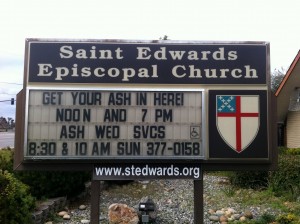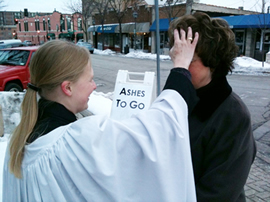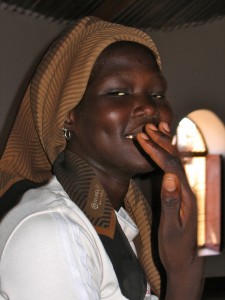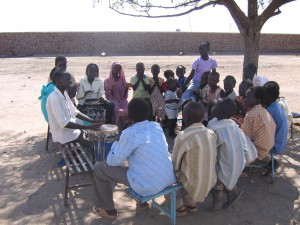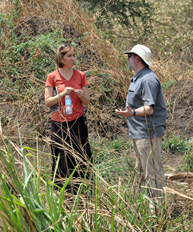Today in our service, we are gathered to honor St. Joseph, the earthly father of our Lord, about whom we know so very little.
Joseph has always gotten something of a short shrift in the Gospels. He’s not mentioned often – 18 times total, more than half indirectly; he never gets to speak … and then he disappears.
But there are some things we do know about him:
•We know he was of the right lineage – Luke says he was of the House of David and a son of Heli, Matthew places him squarely in the lineage from Abraham to David to Jesus.
•We know he built things, that he was a carpenter – Matthew and Mark tell us that, at times obliquely.
•We know he lived in Nazareth – Matthew and Luke say he raised Jesus there, John says he came from there, a reference apparently made so that the disciple Nathaniel can disparage that mountaintop village.
•We know Joseph was a righteous man – Matthew’s Gospel stresses that, both directly: Joseph was a “righteous man,” and indirectly, through the stories Matthew tells us.
•And we know that when God spoke to him through God’s angel, Joseph was obedient. Three times, the angel delivered God’s instructions: Once when Joseph learned that Mary, his betrothed, was pregnant, and not by him; once when the angel told him to flee to Egypt, because Herod was on a murderous bend; and finally when the angel told Joseph it was safe to return to his homeland, that Herod was dead and the child entrusted to Joseph was safe. Three times, Joseph listened. Three times, Joseph obeyed.
So although we might not know much of Joseph, and although we never get to hear Joseph’s story (although the legends about him are legion – really, you could spend hours on the Internet reading things about Joseph, all of which are speculation), there are many similarities in our lives to his:
•Like Joseph, we, too, are of the right lineage, because we have been baptized into the Body of Christ, and thus are heirs of Christ’s eternal kingdom.
•Like Joseph, we, too, are called to build — to build up the Kingdom of God in God’s very good creation.
•Like Joseph, we, too, are called to be righteous people, to live in right relationship with God, to delight in God’s will and walk in God’s ways, not for our own glory, but for the glory of God who loved us into being.
•And like Joseph, we, too, hear God speaking to us, giving us specific instructions that God asks us to obey.
(Now, about that Nazareth piece? Not so much in the way of similarities … not unless you are from one of the many places in the world called Nazareth, which not many of us are, I suspect …)
But setting that minor detail aside, what we end up honor and indeed celebrating this day is this:
God has chosen us … God … has chosen … us … to carry out God’s dreams and God’s desires in God’s very good creation.
God is speaking to us … through all of God’s various messengers … and asking us to listen.
God is entrusting to us, God’s beloved children, the love and care of all of God’s beloved children, our brothers and sisters in Christ, who are related to us not by the blood of their birth but by the waters of their baptism.
Take note, please, that the requests that God made of Joseph?
The request to keep Mary, even though she was pregnant and not by him?
The request to protect the newborn child, by fleeing to Egypt?
The request to return to the land of Israel, so that the Scriptures could be fulfilled?
All of these requests were hard ones. They were difficult.
But they were not impossible.
Refusing to set aside Mary even though the Law-with-a-capital-L said he should do so, to save his honor and punish her for her iniquity … that was difficult. If Joseph knew she was pregnant, you can be sure that others knew as well. His honor was on the line. The Law-with-a-capital-L was at stake.
But Joseph listened to God, not to man, and did the right, the honorable, the loving thing.
Hard, but not impossible.
We are called to do the same: to do the right, the honorable, the loving thing.
Fleeing to Egypt to avoid Herod’s troops? Who wants to leave your homeland, to be a stranger in a strange land, where you know you will be despised and treated poorly?
But Joseph went anyway, in order to protect his wife and the child entrusted to him.
Hard, but not impossible.
We are called to do as Joseph did: To go to the place that God will show us and stay there as long as God needs us there.
Returning home so that the Scriptures could be fulfilled?
I suspect this one was not as hard, that after two years in a strange land, Joseph was more than ready to go home, so this one was probably not as hard, probably did not seem as impossible.
But regardless of the difficulty, Joseph obeyed. He took his family to Nazareth, which decades later would be derided by the disciple Nathaniel, apparently because it wasn’t such a great place to live after all, and certainly never had been mentioned as blessed or as the place from which the Messiah would come.
And in this case, we, too, are called to emulate Joseph, to once again pick up our lives and go again to the place that God sends us, not necessarily to Nazareth but certainly to the place God needs us to be so that the Scriptures can be fulfilled.
In honoring Joseph this day, my friends, we are making a commitment – a commitment to live lives of obedience and righteousness, a commitment to listen to God.
commitment to listen to God.
Because God is speaking to us. God is telling us what to do: to live lives of wild, radical, inexplicable, inexhaustible love.
We can debate how to do this until the cows come home, go out and come home again, but in the end, that’s what it all boils down to: Loving.
Our call this day is to be more like Joseph, who heard and obeyed and worried not about how famous he would be, about what he might get in return for his faithfulness, and less like those who argue, who debate, who endlessly question what to do and why and how.
I know Joseph gets short shrift in the Scriptures. He doesn’t get to say anything. He only is asked to listen, and then to act.
But his actions speak louder than his words.
My prayer for all of us this day is that we will become more and more like Joseph, that we will listen more and speak less, and then act upon the instructions God has given us, trusting that God indeed knows what God is doing.
Amen.
A sermon preached at the Diocese of Southwestern Virginia MDG Day 2011, 19 March 2011, on the Feast of St. Joseph, at St. John’s, Waynesboro, Va.







